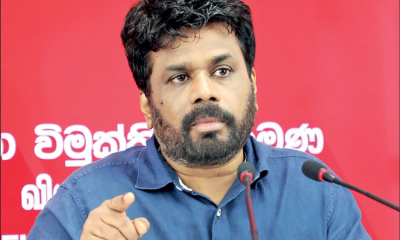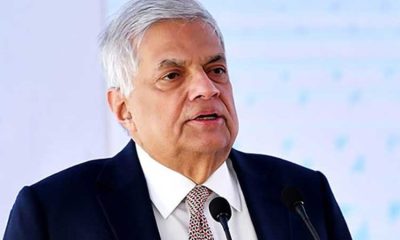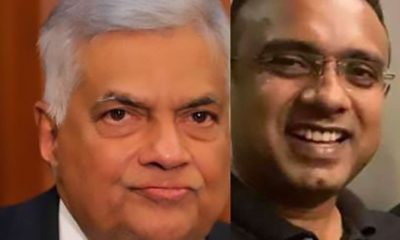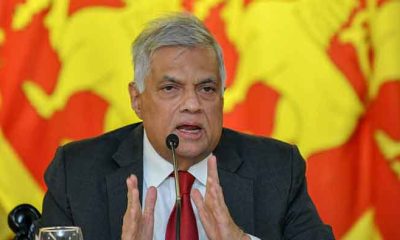News
SLPP rebel MPs urge GR to break his silence on 13 A
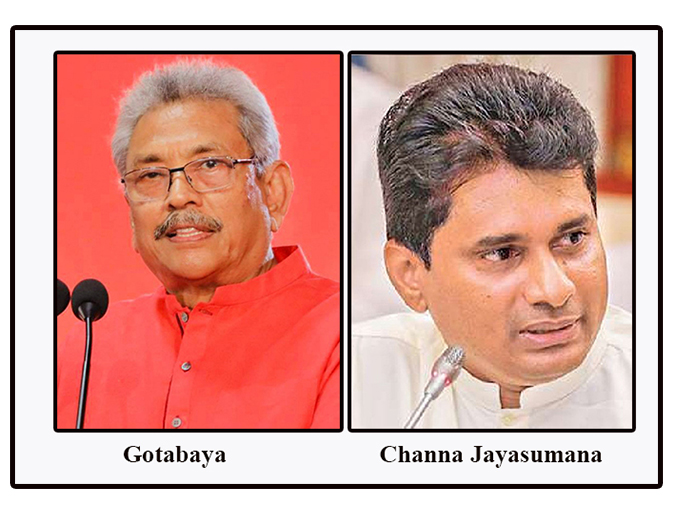
By Shamindra Ferdinando
Rebel SLPP MP Prof. Channa Jayasumana yesterday (11) said that former President Gotabaya Rajapaksa should make his position clear on his successor Ranil Wickremesinghe’s move to fully implement the 13th Amendment to the Constitution.
Reiterating his strong opposition to President Wickremesinghe’s controversial plan, the Anuradhapura District MP stressed that Gotabaya Rajapaksa couldn’t keep silent as the Wickremesinghe-Rajapaksa government embarked on a strategy inimical to national interests. Prof. Jayasumana represents a group of about 13 SLPP MPs. The group includes former External Affairs Minister Prof. G. L. Peiris, Dullas Alahapperuma and Prof. Charitha Herath.
Parliament elected the UNP leader as President in late July last year to complete the remainder of Gotabaya Rajapaksa’s five-year term won at the last presidential election in Nov. 2019, Prof. Jayasumana said. Having won a landslide victory, promising a new Constitution that reflected Sri Lanka’s triumph over separatist terrorism, how could the wartime Defence Secretary remain silent when his mandate was being brazenly used to do away with the country’s unitary status.
Referring to President Wickremesinghe’s latest declarations in Parliament, pertaining to the 13th Amendment to the Constitution, enacted in late 1988, the failure on the part of the former President to take a clear stand on this issue could be misconstrued as his tacit support to the current agenda. How the wartime Defence Secretary could allow the abuse of his mandate, the MP asked.
Responding to a query broached by The Island, the academic said that 133 MPs, who voted for Wickremesinghe at the July 20 election in Parliament to elect an MP to complete the ousted leader’s term, wouldn’t have anticipated him taking such far reaching decisions.
Prof. Jayasumana voted for Dullas Alahappeuma who altogether polled 82 votes whereas JVP candidate Anura Kumara Dissanayake managed to secure just three votes. Prof. Jayasumana addressed this issue in the wake of TNA delegation meeting Public Security Minister Tiran Alles to discuss the latest developments.
Acknowledging that the SLPP General Secretary Sagara Kariyawasam, during All-Party Conference (APC), chaired by President Wickremesinghe, on 26 July, declared that they were not on the same page, Prof. Jayasumana urged the SLPP parliamentary group, headed by Prime Minister Dinesh Gunawardena, to issue an official statement in this regard.
Appreciating the significant financial support extended by India during Sri Lanka’s hour of need, MP Jayasumana said but it wouldn’t be fair at all to pressure the incumbent government on the 13th Amendment. “We do not want to revisit the origins of terrorism but India cannot absolve itself of the responsibility for creating an environment here in the ’80s to facilitate its devolution project,” Prof. Jayasumana said.
The MP said that if the former President and the SLPP, still the largest party represented in parliament, didn’t intervene immediately, they would be held accountable for breaking up the country. The outcome could be far worse than the debilitating current crisis blamed on mismanagement of the national economy, Prof. Jayasumana said.
The former President should be answerable to 6.9 mn voters who exercised their franchise for him at the last presidential poll, the MP said. Similarly, the SLPP couldn’t turn its back on those who gave the young party nearly 2/3 majority, Prof. Jayasumana said.
Having recognized the LTTE, way back in 2001, as the sole representative of the Tamil speaking people, thereby justifying Tiger terrorism, the TNA was now demanding federal status, Prof. Jayasumana said, urging the incumbent President to seek fresh mandates at presidential and parliamentary polls if he genuinely wanted to go ahead with the 13th Amendment.
Those pushing for the13th Amendment had conveniently forgotten the way the then President J.R. Jayewardene forcibly enacted it in line with the Indo-Lanka Accord signed the year before, an irate lawmaker said. The MP said that political parties couldn’t be unaware that the implementation of the 13th Amendment was to take place after the disarming of all Indian trained terrorist groups in 1987.
The LTTE retained a conventional fighting capacity till 2009 and was defeated in May 2009, the Minister said, adding that there couldn’t be any justification in granting police powers to a region that challenged the country’s unitary status.
Latest News
58,454 International aircraft movements in Sri Lanka in first 11months of 2025 – Ministry of Ports and Civil Aviation

According to figures released by the Ministry of Ports and Civil Aviation there have been 58,454 international aircraft movements in the first 11 months of 2025 in Sri Lanka. [An aircraft movement refers to the count of take offs and landings at an airport]
The figures also confirm that tourist arrivals via air stands at 2.1 million.
Latest News
Highest revenue in 93-year history of Inland Revenue Department collected in 2025

The Inland Revenue Department has succeeded in collecting Rs. 2,203 billion in revenue in 2025, the highest amount recorded in its 93-year history. This represents a surplus of Rs. 33 billion over the revenue target for the year and a 15 per cent increase compared with the revenue collected in the previous year, stated Commissioner-General of Inland Revenue Ms Rukdevi Fernando.
She made these remarks at a discussion held on Tuesday (30) morning at the Department’s auditorium under the patronage of President Anura Kumara Dissanayake.
Marking the first occasion in the 93-year history of the Inland Revenue Department that a President has visited the Department, the President attended a meeting with the staff to review the progress achieved in 2025 and the new plans for 2026.
The President expressed his appreciation to all officers and staff of the Inland Revenue Department for surpassing the revenue expected by the Government and urged everyone to continue working towards a common objective in order to realise the economic transformation required for the country.
Emphasising that no individual is entitled to the privilege of evading taxes, the President stated that the era in which a tax culture prevailed based on personal or political affiliations has come to an end. He further stressed that the law will be enforced without hesitation, irrespective of status, against those who attempt to evade taxes.
The President also pointed out that tax collection is neither repression nor coercion but a legitimate right of the State, adding that necessary changes will be made to laws, regulations, designations and staffing in order to secure this contribution.
He further emphasised that the Government’s objective is to ensure that the benefits of these economic achievements flow to the people of the country. The Government is focusing on improving essential public services to enhance the quality of life, undertaking a new transformation of the transport system and providing adequate allocations for the development of the education and health sectors.
The President also highlighted the need for a targeted programme to properly collect the taxes due to the Government by addressing issues such as improving tax literacy, simplifying the tax system and filling staff shortages.
Ms Rukdevi Fernando stated that the professional competence and dedication of the Department’s officers were the key factors behind this success.
She further noted that a revenue target of Rs. 2,401 billion has been set for 2026 and that the Department expects to achieve this through programmes aimed at enhancing tax compliance and broadening the tax base.
In addition, she said that the Department plans to expand third-party data sharing, strengthen investigations into domestic and overseas assets, take over the RAMIS system, reinforce risk-based auditing, introduce e-invoicing, adopt modern technology for tax administration and enhance tax ethics in 2026.
Minister of Labour and Deputy Minister of Finance and Planning Dr Anil Jayantha Fernando, Deputy Minister of Economic Development Nishantha Jayaweera, Secretary to the President Dr Nandika Sanath Kumanayake, Commissioner-General of Inland Revenue Ms Rukdevi Fernando and senior officials and staff of the Department were present at the occasion.
Business
Sri Lanka Customs exceeds revenue targets to enters 2026 with a surplus of Rs. 300 billion – Director General

The year 2025 has been recorded as the highest revenue-earning year in the history of Sri Lanka Customs, stated Director General of Sri Lanka Customs, Mr. S.P. Arukgoda, noting that the Department had surpassed its expected revenue target of Rs. 2,115 billion, enabling it to enter 2026 with an additional surplus of approximately Rs. 300 billion.
The Director General made these remarks at a discussion held on Tuesday (30) morning at the Sri Lanka Customs Auditorium, chaired by President Anura Kumara Dissanayake.
The President visited the Sri Lanka Customs Department this to review the performance achieved in 2025 and to scrutinize the new plans proposed for 2026. During the visit, the President engaged in extensive discussions with the Director General, Directors and senior officials of the Department.
Commending the vital role played by Sri Lanka Customs in generating much-needed state revenue and contributing to economic and social stability, the President expressed his appreciation to the entire Customs employees for their commitment and service.
Emphasizing that Sri Lanka Customs is one of the country’s key revenue-generating institutions, the President highlighted the importance of maintaining operations in an efficient, transparent and accountable manner. The President also called upon all officers to work collectively, with renewed plans and strategies, to lead the country towards economic success in 2026.
The President further stressed that the economic collapse in 2022 was largely due to the government’s inability at the time to generate sufficient rupee revenue and secure adequate foreign exchange. He pointed out that the government has successfully restored economic stability by achieving revenue targets, a capability that has also been vital in addressing recent disaster situations.
A comprehensive discussion was also held on the overall performance and progress of Sri Lanka Customs in 2025, as well as the new strategic plans for 2026, with several new ideas and proposals being presented.
Sri Lanka Customs currently operates under four main pillars, revenue collection, trade facilitation, social protection and institutional development. The President inquired into the progress achieved under each of these areas.
It was revealed that the Internal Affairs Unit, established to prevent corruption and promote an ethical institutional culture, is functioning effectively.
The President also sought updates on measures taken to address long-standing allegations related to congestion, delays and corruption in Customs operations, as well as on plans to modernize cargo inspection systems.
The discussion further covered Sri Lanka Customs’ digitalization programme planned for 2026, along with issues related to recruitment, promotions, training and salaries and allowances of the staff.
Highlighting the strategic importance of airports in preventing attempts to create instability within the country, the President underscored the necessity for Sri Lanka Customs to operate with a comprehensive awareness of its duty to uphold the stability of the State, while also being ready to face upcoming challenges.
The discussion was attended by Minister of Labour and Deputy Minister of Finance and Planning, Dr. Anil Jayanta Fernando, Deputy Minister of Economic Development, Nishantha Jayaweera, Secretary to the President, Dr. Nandika Sanath Kumanayake, Deputy Secretary to the Treasury, A.N.Hapugala, Director General of Sri Lanka Customs, S.P.Arukgoda, members of the Board of Directors and senior officials of the Department.
-

 News7 days ago
News7 days agoBritish MP calls on Foreign Secretary to expand sanction package against ‘Sri Lankan war criminals’
-

 News6 days ago
News6 days agoStreet vendors banned from Kandy City
-

 Sports7 days ago
Sports7 days agoChief selector’s remarks disappointing says Mickey Arthur
-

 Opinion7 days ago
Opinion7 days agoDisasters do not destroy nations; the refusal to change does
-

 Sports3 days ago
Sports3 days agoGurusinha’s Boxing Day hundred celebrated in Melbourne
-

 News6 days ago
News6 days agoLankan aircrew fly daring UN Medevac in hostile conditions in Africa
-

 Sports4 days ago
Sports4 days agoTime to close the Dickwella chapter
-

 News21 hours ago
News21 hours agoLeading the Nation’s Connectivity Recovery Amid Unprecedented Challenges


